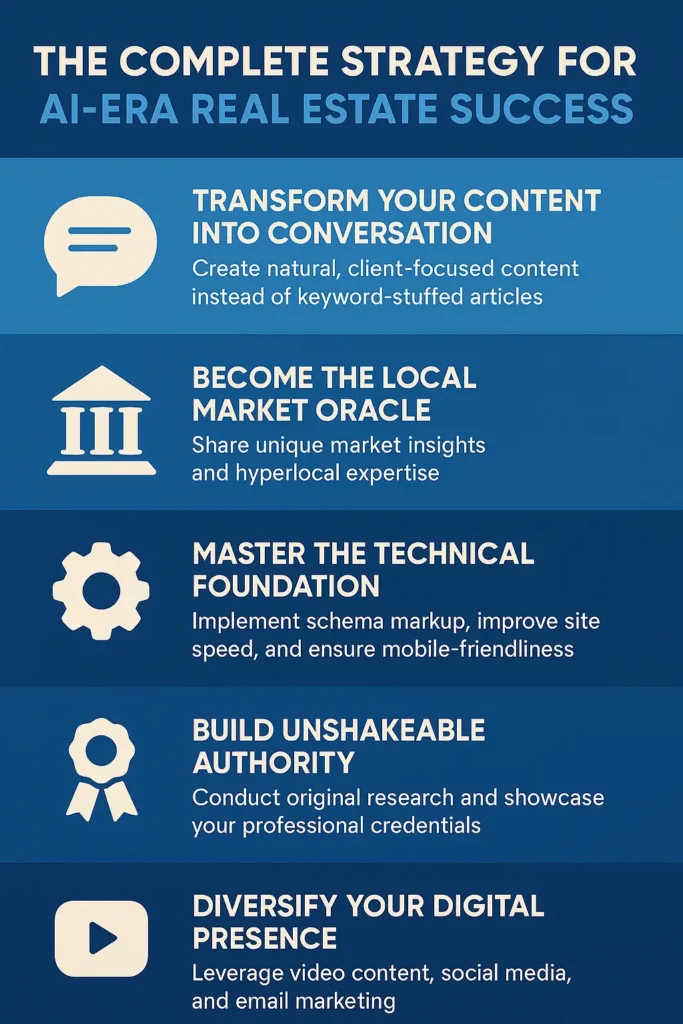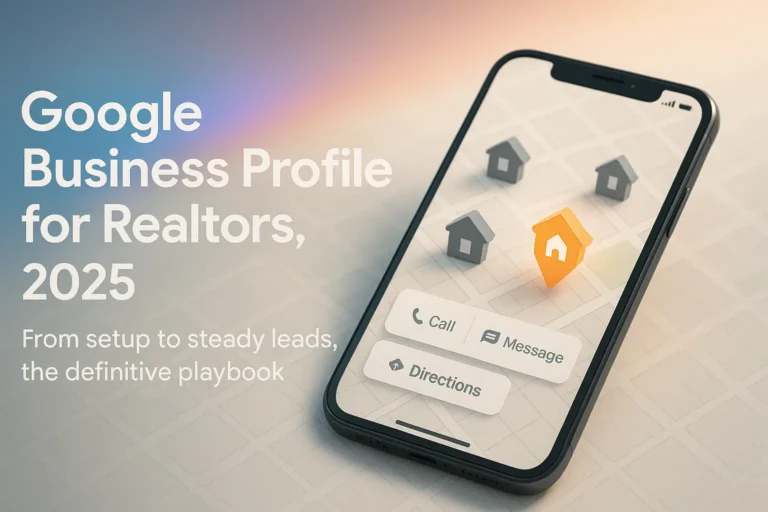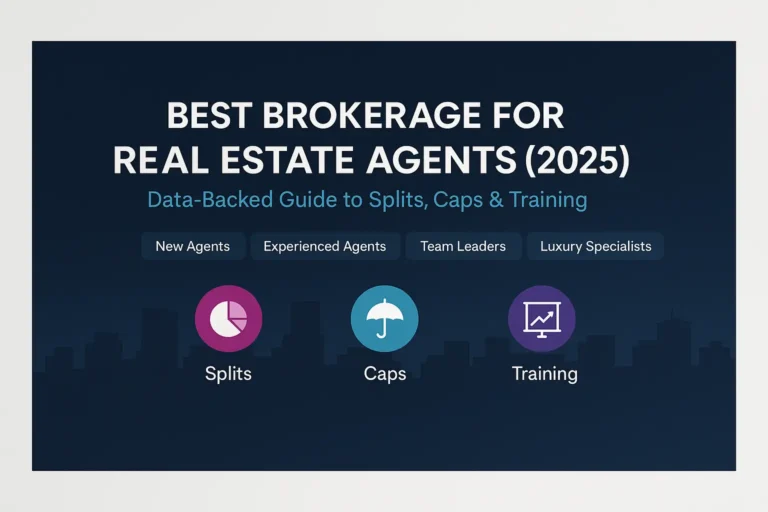The Real Estate Professional’s Complete Guide to Thriving in Google’s AI-Dominated Search Era
If you’re a real estate professional who’s been watching your website traffic plummet over the past year, you’re not alone. The ground beneath our feet has shifted dramatically, and many agents and brokers are struggling to understand what happened to their once-reliable stream of organic leads.
Here’s the reality: Google’s AI Overviews have fundamentally changed the game. These AI-generated summaries now appear in 65-68% of all searches, sitting prominently above traditional search results like a digital gatekeeper between you and your potential clients. For many real estate professionals, this feels like a devastating blow. But what if I told you that this massive disruption also presents the greatest opportunity you’ve ever had to establish yourself as the undisputed authority in your local market?
The AI Revolution That’s Reshaping Real Estate Search
Let’s start with what’s really happening. Google’s AI Overviews aren’t just another search feature – they’re a complete reimagining of how people discover information. These AI-powered summaries use Google’s advanced Gemini AI models to break down complex questions into subtopics and analyze multiple data sources simultaneously.
When someone searches for “best neighborhoods for young families in Denver,” instead of clicking through to your carefully crafted blog post, they’re getting an instant AI-generated answer that pulls information from various sources, including yours. The AI provides a comprehensive answer right there on the search results page, complete with clickable links to source websites.
Here’s what this means for your business in real numbers:
The Traffic Reality Check:
- Click-through rates for position 1 results have dropped by 34.5% when AI Overviews appear (source – Ahrefs, Apr 2025)
- Non-branded keywords are seeing a 19.98% decline in CTR (source –Amsive, Apr 2025)
- Keywords not ranking in the top 3 positions are experiencing a 27.04% drop in clicks
- Mobile searches are showing zero-click rates exceeding 75%
Google’s view: In an August 6, 2025 statement, Liz Reid (Head of Search) shared that total clicks from Google Search remain “relatively stable” year over year—even with AI Overviews in play. Google claims traffic is simply redistributed toward content with original insight, expert commentary, or rich media like videos and community posts.
But here’s what local agents are seeing: Many smaller real estate sites report a different experience. When AI Overviews answer top-level questions directly in search results, users often skip deeper local insights. The result? Fewer visitors—and lower-quality leads—for agents who were previously ranking well for long-tail, hyperlocal queries.
But here’s where it gets interesting: while overall traffic is declining, branded searches that trigger AI Overviews are actually seeing an 18.68% increase in click-through rates. This tells us something crucial about the opportunity hiding within this challenge.
Why This Isn’t the End of the World (It’s Actually the Beginning of Something Better)
Agent: Sarah Martinez, East-Austin specialist
Before (Apr 2025):
After Google’s AI Overviews launched, Sarah’s site lost 30% of organic traffic and 22% of form leads. Her blog posts were outranked by national portals, and branded search volume dropped sharply.
Action Taken:
We rebuilt her key content pages with deeper insights, added FAQ schema based on real buyer questions, and produced five 60-second hyper-local video tours (Mueller, Windsor Park, Holly District). We also rewrote intros using a more conversational, answer-first tone.
After (Jul 2025):
Branded clicks rose by 18%, discovery call bookings jumped 27%, and her site was featured in Austin Realty Watch. Two of her videos now appear in AI Overviews. Her lead-to-client conversion rate increased from 8% to 12%.
I know it feels overwhelming. You’ve spent years building your SEO strategy, creating content, and climbing the rankings, only to watch AI summaries steal your thunder. But let me share a different perspective based on what we’re seeing from agents who are already adapting successfully.
The truth is, AI Overviews are forcing a much-needed evolution in how real estate professionals approach digital marketing. The days of thin, keyword-stuffed content are over. The era of authentic expertise and genuine value creation has begun.
The Hidden Opportunity:
When your content appears in an AI Overview, you’re not just getting a backlink – you’re getting an AI-powered endorsement of your expertise. Google’s AI is essentially telling searchers, “This person knows what they’re talking about.” That’s brand authority money can’t buy.
Consider this: a potential client searching for “when to sell my house in Austin” sees an AI Overview that prominently features insights from your blog post about Austin market timing. Even if they don’t click through to your website immediately, they’ve been exposed to your expertise. When they’re ready to make a decision, whose name do you think they’ll remember?
Want help auditing your website’s SEO performance?
Book a free 15-min strategy call →Understanding the New Search Behavior
The way people search for real estate information has evolved dramatically. Today’s homebuyers and sellers are asking more sophisticated questions:
- “What are the tax implications of selling my home in California in 2025?”
- “How do rising interest rates affect the Seattle housing market specifically?”
- “What should I know about buying a home in a flood zone in Florida?”
These aren’t simple keyword searches – they’re complex queries that require nuanced, expert-level answers. AI Overviews excel at handling these types of questions, which means your content needs to excel at providing comprehensive, authoritative responses.
The Complete Strategy for AI-Era Real Estate Success

1. Transform Your Content Into Conversation
The biggest mistake I see real estate professionals making is continuing to write for search engines instead of writing for humans. AI Overviews favor content that sounds natural and conversational, like you’re sitting across from a client explaining complex concepts in simple terms.
Before AI Overviews: “Denver real estate market analysis shows property values increased 12% year-over-year with median home prices reaching $650,000 in Q4 2024.”
After AI Overviews: “If you’re wondering whether Denver’s red-hot housing market is sustainable, here’s what the numbers are telling us. Property values jumped 12% this year, bringing the median home price to $650,000. But here’s what those numbers don’t show: the underlying factors that suggest this growth isn’t just a bubble.”
See the difference? The second version invites the reader into a conversation while providing the same factual information. It anticipates their concerns and promises deeper insights.
Robot Copy (Old)
Denver real estate market analysis shows property values increased 12 % year-over-year with median home prices reaching $650,000 in Q4 2024.
Human Copy (New)
If you’re wondering whether Denver’s red-hot market is sustainable, here’s what the numbers say. Prices jumped 12 % to a $650k median this year—but the deeper story points to long-term strength, not a bubble.
Content Topics That Win in AI Overviews:
- “The Real Reason Home Prices Are Rising in [Your City] (And What It Means for You)”
- “A Local Agent’s Guide to Buying Your First Home in [Neighborhood]”
- “Why I Tell My Clients to Wait (Or Not Wait) to Sell in Today’s Market”
- “The Hidden Costs of Homeownership in [Your Area] Nobody Talks About”
2. Become the Local Market Oracle
AI can synthesize information from multiple sources, but it can’t replace local expertise gained from years of working in your market. This is your competitive advantage, and it’s more valuable now than ever.
Creating Irreplaceable Local Content:
Market Trend Analysis with Personal Insight: Instead of just reporting that inventory is low, explain what you’re seeing in your daily work. “I’ve noticed something interesting in my showings this month. Homes priced correctly are still selling within 10 days, but I’m seeing more properties sit on the market when they’re even 5% overpriced. Here’s why this shift matters for sellers…”
Neighborhood Expertise Nobody Else Has: Share insights that only come from working directly with buyers and sellers in specific areas. “Three of my clients chose Riverside Elementary’s district specifically because of the new STEM program launching next year. Here’s what parents need to know about how school improvements affect property values…”
Hyperlocal Market Predictions: Use your on-the-ground experience to make educated predictions about local market conditions. “Based on the development permits I’ve been tracking and conversations with local builders, I expect the Southside neighborhood to see significant price appreciation over the next 18 months. Here’s why…
3. Master the Technical Foundation
While content is king, technical SEO remains the foundation that makes everything else possible. AI Overviews rely heavily on structured data to understand and categorize content.
Essential Technical Elements:
Schema Markup Implementation:
- LocalBusiness schema for your agency
- RealEstateAgent schema for individual agents
- PropertyListing schema for listings
- FAQ schema for common questions
- Review schema for testimonials
Site Performance Optimization: Your website needs to load in under 3 seconds. AI Overviews prioritize user experience, and Google’s algorithms favor fast, responsive sites. This isn’t just about SEO – it’s about not losing potential clients to slow loading times.
Mobile-First Design: With mobile searches showing even higher zero-click rates, your mobile experience needs to be flawless. Every piece of content should be easily consumable on a smartphone.
🧰 Real Estate SEO Toolbox (Free Tools We Use & Recommend)
Here are some of our favorite tools to speed up audits, validate technical SEO, and gain instant insights:
4. Build Unshakeable Authority
The most successful real estate professionals in the AI era will be those who establish themselves as the undisputed experts in their local markets. This goes beyond just creating content – it’s about building a reputation that precedes you.
Authority-Building Strategies:
Original Research and Data Analysis: Create unique insights that can’t be found anywhere else. Analyze local market data, survey your clients, track neighborhood trends, and publish your findings. When you’re the source of original information, you become indispensable.
Community Involvement Documentation: Don’t just participate in local events – document your involvement and share insights about how community developments affect real estate values. This builds both local connections and content authority.
Professional Credential Showcasing: Make your expertise visible through detailed author bio pages, case studies, and success stories. AI systems are increasingly sophisticated at recognizing and valuing professional credentials.
5. Diversify Your Digital Presence
Relying solely on organic search traffic was always risky. AI Overviews make diversification essential for long-term success.
Multi-Channel Approach:
Video Content Strategy: Create neighborhood tour videos, market analysis presentations, and educational content about the buying/selling process. Video content is increasingly featured in AI Overviews, giving you another avenue for visibility.
Social Media Integration: Use social platforms to amplify your content and build direct relationships with potential clients. Share snippets of your blog posts, behind-the-scenes content, and market insights.
Email Marketing Renaissance: With fewer website visitors, maximizing the value of each visitor becomes crucial. Create compelling lead magnets that encourage email signups, then nurture those relationships with valuable, regular content.
Networking and Referral Systems: Never underestimate the power of human connections. Build relationships with other professionals in your area – mortgage brokers, home inspectors, contractors – who can refer clients to you.
Advanced Strategies for AI Optimization
Creating AI-Friendly Content Structures
AI Overviews love content that’s structured logically and provides comprehensive answers. Here’s how to optimize your content structure:
The Question-Answer Framework: Structure your content around the questions your clients actually ask. Use natural language that mirrors how people speak.
Comprehensive Topic Coverage: Don’t just scratch the surface. When you write about a topic, cover all the related subtopics that someone might want to know about. AI Overviews favor comprehensive, authoritative content.
Clear, Logical Organization: Use headers, subheaders, and bullet points to make your content easy to scan and understand. AI systems can better parse well-organized content.
Leveraging AI Tools for Content Creation
The irony isn’t lost on me – we’re using AI to compete with AI. But the key is using AI as a tool to enhance your human expertise, not replace it.
AI-Assisted Content Workflow:
- Use AI tools like ChatGPT for initial research and outline creation
- Add your personal experience and local insights
- Include unique data and observations from your market
- Maintain your authentic voice and personality
- Fact-check and ensure local relevance
Content Scaling Strategy: AI tools can help you create more content faster, but every piece should include your unique perspective and expertise. Use AI for efficiency, not as a replacement for your professional knowledge.
Voice Search Optimization
With voice assistants becoming more sophisticated, optimizing for voice search is crucial for staying ahead of the curve.
Voice Search Best Practices:
- Target conversational, question-based keywords
- Create FAQ sections with natural language
- Optimize for “near me” and location-based queries
- Use conversational language throughout your content
Measuring Success in the AI Era
Traditional SEO metrics don’t tell the whole story anymore. You need to track new indicators of success that account for AI Overview impacts.
New Success Metrics:
Brand Visibility Tracking: Monitor when your content appears in AI Overviews using tools like Ahrefs or SEMrush. Set up Google Alerts for your brand name and key topics.
Direct Traffic Analysis: Watch for increases in direct traffic and branded searches, which indicate growing brand recognition from AI Overview appearances.
Lead Quality Assessment: Focus on the quality of leads rather than just quantity. Are the leads coming from AI Overviews converting at higher rates?
Local Market Authority Indicators: Track mentions in local media, speaking opportunities, and referrals from other professionals as indicators of growing authority.
Conversion Optimization Focus: With potentially fewer website visitors, maximize the value of each visitor through improved conversion rates.
🗂️ Quarterly Local Authority Scorecard Benchmark your brand strength every 90 days—then refine your game plan.| Metric | Baseline (Today) |
+90 Days | +180 Days | +270 Days | +360 Days | Goal (360 d) |
Notes |
|---|---|---|---|---|---|---|---|
| AI Overview Citations | |||||||
| Direct Traffic Sessions | |||||||
| Referral Traffic Sessions | |||||||
| Email Subscribers | |||||||
| Speaking Invitations |
Need a second set of eyes?
Book a free twenty-minute AI SEO Snapshot call and leave with one quick win you can apply right away.
The Future of Real Estate SEO
The AI revolution is just beginning. Google’s AI models are becoming more sophisticated, and new AI-powered features are being rolled out regularly. The real estate professionals who succeed will be those who view this as an ongoing evolution rather than a one-time change.
Preparing for What’s Next:
Continuous Learning: Stay informed about AI developments and their implications for real estate marketing. Join industry groups, attend conferences, and follow thought leaders who are tracking these changes.
Flexible Strategy Development: Build marketing strategies that can adapt to future changes. Focus on fundamental principles – providing value, building authority, and serving clients – rather than tactics that might become obsolete.
Technology Integration: Consider how AI tools can enhance your business operations beyond just marketing. Customer service chatbots, predictive market analysis, and automated lead scoring are all areas where AI can add value.
Building Your AI-Resistant Real Estate Business
The most successful real estate professionals in the AI era will be those who use this disruption as an opportunity to build stronger, more resilient businesses.
The Resilience Framework:
Relationship-Centric Approach: While AI can provide information, it can’t replace the human touch that’s essential in real estate transactions. Focus on building genuine relationships with clients and your local community.
Expertise-Based Positioning: Position yourself as the local expert who provides insights and guidance that AI can’t replicate. Your years of experience, local knowledge, and professional judgment are irreplaceable.
Value-First Mindset: Always ask yourself: “How can I provide more value to my clients and community?” This mindset will guide you toward content and strategies that succeed regardless of how search algorithms evolve.
Frequently Asked Questions
How quickly should I expect to see results from AI-optimized content?
The timeline varies depending on your current authority and competition level. Most real estate professionals see initial improvements in brand visibility within 3-6 months, with significant traffic and lead quality improvements taking 6-12 months. The key is consistency and patience while building authority.
Should I completely abandon my existing SEO strategy?
No, don’t throw away what’s working. Instead, evolve your strategy to include AI-focused elements. Keep your successful local SEO practices while adding conversational content and authority-building activities. Think of it as upgrading your existing foundation rather than starting over.
How do I compete with large real estate platforms like Zillow in AI Overviews?
Focus on hyperlocal expertise and personal insights that large platforms can’t provide. Create content about specific neighborhoods, local market conditions, and your personal experiences. Build relationships in your community and establish yourself as the go-to local expert. AI Overviews often feature local experts alongside national platforms.
What’s the most important thing I should focus on first?
Start with content quality and local authority building. Review your existing content and identify opportunities to add more depth, local insight, and conversational tone. Simultaneously, work on building your reputation in your local community through networking and professional development.
How do I know if my content is appearing in AI Overviews?
Use SEO tools like Ahrefs, SEMrush, or BrightEdge to track AI Overview appearances. Set up Google Alerts for your brand name and key topics. Manually search for your target keywords to see if your content appears in AI-generated summaries. Monitor your Google Search Console for changes in impression patterns.
Can AI Overviews actually help my business grow?
Absolutely. While they may reduce immediate clicks, AI Overviews can significantly boost your brand authority and visibility. Many agents report that appearing in AI Overviews leads to more direct searches, referrals, and inquiries. The key is viewing it as a brand-building opportunity rather than just a traffic source.
What should I do if my traffic has already dropped significantly?
Don’t panic. Focus on improving your content quality and building authority while diversifying your lead sources. Invest in direct marketing, social media, and networking. Create valuable content that encourages direct site visits and email signups. Consider it an opportunity to build a more resilient business model.
How important is video content for AI Overviews?
Video content is increasingly important as AI Overviews begin featuring more multimedia content. Create neighborhood tours, market analysis videos, and educational content about the buying/selling process. Optimize video titles and descriptions for search, and include transcripts for accessibility.
Should I use AI tools to create my real estate content?
AI tools can be helpful for initial research and drafting, but always add your human expertise and local insights. Use AI for efficiency while maintaining authenticity and personal experience. The goal is to enhance your productivity without losing the personal touch that makes your content valuable.
How do I measure ROI from AI-focused SEO efforts?
Track a combination of traditional metrics and new indicators: brand visibility in AI Overviews, direct traffic increases, lead quality improvements, local market authority growth, and overall business impact. Focus on long-term brand building rather than just short-term traffic gains.
What’s the biggest mistake real estate professionals make with AI Overviews?
The biggest mistake is trying to fight the change instead of adapting to it. Some agents focus solely on trying to get more clicks rather than building authority and providing value. Others give up on SEO entirely. The key is evolution, not revolution.
How can I stay updated on AI developments that affect real estate SEO?
Follow SEO industry publications, join real estate marketing groups, and attend conferences focused on digital marketing. Set up Google Alerts for terms like “AI Overviews,” “real estate SEO,” and “Google AI updates.” Consider joining mastermind groups with other forward-thinking agents.
Is Google’s AI Overview available in my city yet?
Google’s AI Overviews are rolling out globally and are already active in most major cities across the United States, Canada, and many international markets. The feature appears in approximately 65% of all searches regardless of location, though local search results may vary. To check if AI Overviews are active in your area, simply search for common real estate questions like “best neighborhoods for families” or “current home prices” in your city. If you see AI-generated summaries at the top of results, the feature is live in your market. The rollout continues expanding, so even if you don’t see it yet, it’s likely coming soon to your area.
Can a small brokerage beat Zillow in AI results?
Absolutely, and here’s why small brokerages actually have advantages over large platforms like Zillow in AI Overviews. AI systems value expertise, local knowledge, and comprehensive answers over just brand size. Your deep neighborhood expertise, personal market insights, and authentic client experiences are exactly what AI Overviews prioritize. Focus on creating hyperlocal content about specific neighborhoods, sharing unique market observations, and providing personalized insights that Zillow’s generic algorithms can’t match. Many successful agents are already appearing in AI Overviews alongside or instead of major platforms by demonstrating superior local expertise and providing more detailed, helpful answers to specific questions.
How do I check if my article is used in an Overview?
There are several ways to monitor your AI Overview appearances. The quickest method is manually searching for your target keywords and looking for your content in the AI-generated summaries at the top of results. For systematic tracking, use SEO tools like Ahrefs, SEMrush, or BrightEdge, which now include AI Overview monitoring features. Set up Google Alerts for your brand name combined with key topics you write about. Monitor your Google Search Console for unusual spikes in impressions without corresponding clicks, which often indicates AI Overview appearances. You can also use tools like Surfer SEO or Frase to track when your content gets cited in AI responses. Remember to check both desktop and mobile search results, as AI Overview appearance can vary between devices.
Your Next Steps: From Survival to Success
The AI revolution in search isn’t something that’s coming – it’s already here. The question isn’t whether you’ll be affected, but how you’ll respond. The real estate professionals who thrive in this new era will be those who embrace change, focus on building genuine authority, and consistently provide exceptional value to their communities.
Start with these immediate actions:
- Audit your existing content and identify opportunities to add depth and local insight
- Begin building relationships in your local community beyond just client transactions
- Invest in your expertise through continued education and professional development
- Diversify your marketing channels to reduce dependence on organic search alone
- Start tracking AI Overview appearances to understand your current visibility
Remember, every major shift in technology creates winners and losers. The difference is usually not who has the most resources, but who adapts most quickly and effectively. You have the opportunity to position yourself as the clear leader in your local market during this transition period.
The future of real estate belongs to the professionals who can demonstrate genuine expertise, build lasting relationships, and adapt to the evolving digital landscape while maintaining the human touch that remains essential in real estate transactions. AI may be changing how people find information, but the need for trusted, knowledgeable local experts has never been stronger.
Your success in the AI era depends not on fighting these changes, but on leveraging them to showcase your expertise and build deeper connections with your community. The agents who understand this will emerge as the clear winners in this new era of real estate marketing.
The revolution is here. How will you respond?








3 Comments